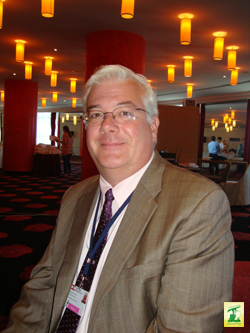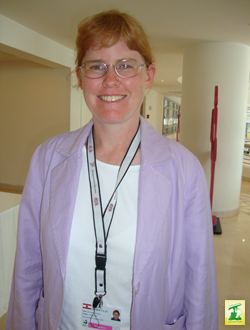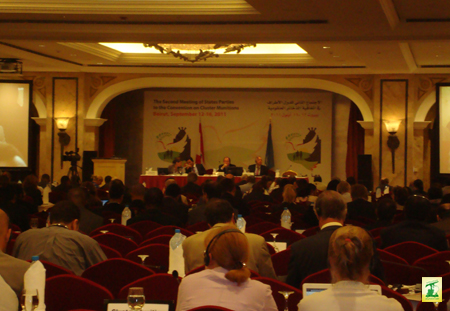HRW, A Leading Coacher of CCM

As diplomats and attendants tackle the updates of the Second Meeting of States Parties to the Convention of Cluster Munitions (CCM) held in Beirut, victims and activists from many international organizations are also taking part in the conference to reconfirm their commitment to implementing the article of the convention.
Participants vowed to do their best to push all non-states parties to sign and ratify the convention, for what serves the international community.
On his part, Mark Hiznay, a Senior Researcher at Human Rights Watch (HRW) in the Arms Division stated, "I've had prior military experience and an experience in working with munitions, so I bring the technical issue into the campaign".
Being an ex-military personnel, Hiznay explained to moqawama.org that Cluster Munitions were made for situations when one side is outnumbered by the other, they are designed to kill faster, because the other side was outnumbered and they needed to compensate to the numbers.
"What eventually happened in the wars that they [cluster munitions] were designed for, whether in the past in the Korean war in the 1950s or the massive tank battle that was supposed to happen in Germany in the cold war, is that neither has ever happened", he further noted.
Hiznay clarified, "So the weapons are now being used in situations that are not optimized to be used, they are being used in circumstances where the users really don't know the location of the target but instead they attack the whole area with the weapon".

Moreover, the senior HRW researcher affirmed, "Unfortunately the sub-munitions inside the cluster munitions also failed at a very high rate, so they lay on the ground waiting to be disturbed, and we all know that the weapon cannot distinguish between a civilian and a combatant".
"That is why we think that, because of this inaccuracy in attacking the whole area, this technical problem brings up so many dud munitions; therefore these weapons should be banned and taken away from the military", Mark Hiznay stressed.
Upon question regarding the US and "Israeli" use of cluster munitions, Hiznay recalled that the US has used cluster munitions in Iraq in 2003 and there are reports that they were used in Yemen in December 2009 during a cruise missile strike on a training camp, but that is not been confirmed by the US government.
"The US has worked very hard to retain its ability to use cluster munitions in the next ten years. Basically, during the time this treaty was negotiated, they adopted their own national policy which in effect removes 99% of their cluster munitions. So the US gave itself ten years to get rid of the cluster munitions", he stated.
However he said that the aforementioned step gained them more flexibility to use cluster munitions every now and then in any circumstances.
On the level of the "Israeli" enemy, Hiznay went on to say that "Israel" has taken no steps regarding cluster munitions and controlling the regulating areas.
"When they have spoken about this convention, "Israel" was very clear that they are in no way considering joining it", Hiznay confirmed.
After his January 2001 visit to examine the aftermath of the "Israeli" withdrawal from South Lebanon, Hiznay now attends the Second Meeting of States Parties to the CCM, and believes that the latter would have a future effect.
"We think that this convention will have effect both in the sense that cluster munitions are going to be harder to use, and regarding the public reaction to the use of cluster munitions. When cluster munitions are used it is going to get a public outcry; thus it would make the government and military think twice", he reaffirmed.
"So this weapon is becoming politically harder to use, and hopefully as we see no one is making more cluster munitions; as industry looks and sees the ban and people disinvesting in these weapons", Hiznay added.
"Our goal is to make it hard as possible for states like the US and "Israel" to use cluster munitions", he stressed, referring to his organization's role in this regard.
On the other hand, Bonnie Docherty, another Senior Researcher at Human Rights Watch in the Arms Division, who has visited Lebanon after the 2006 to work on the HRW report condemning the "Israeli" attacks and use of cluster bombs against civilians, indicated HRW's leading role in establishing the CCM.
"Human Rights Watch is one of the leaders at getting the convention, we are one of the coachers and founders of the Cluster Munition Coalition, and we continue to work very strongly on the interpretation and the universalization of the convention since it's adopted", Docherty affirmed.

On the level of the "Israeli" use of cluster munitions in Lebanon during the July 2006 war, Bonnie Docherty indicated in an interview with moqawam.org, "We issued a report regarding south Lebanon on the "Israeli" use of cluster munitions during the conflicts, and we were very concerned about this and believed that it violated an existing international law".
She added that the Convention on Cluster Munitions had not yet been established back then, however "Israel" violated existing customary laws, because its attacks were indiscriminate and left behind hundreds of thousands of sub-munitions that continue to kill civilians.
Commenting on whether "Israel" would consider joining the CCM, Senior HRW researched stated, "I don't think "Israel" would be the first one to sign the convention, and I think it would be a challenge for it to join the convention; however we do think that the convention is going to stigma against the use of cluster munitions".
"Hopefully it will keep the states like "Israel", which are not party to the convention, away from using cluster munitions", she added.
Furthermore, she affirmed that the same is applied to the US, noting that it has set a domestic policy which is a good step forward, but is far weaker than the CCM, and HRW is very concerned regarding what the US is doing.
"I think this convention has a future. I think there are a hundred and ten states so far that have either signed or acceded to the convention, this is more than half of the international community, and we have already seen that the stigma against cluster munitions is growing", Docherty pointed out.
The HRW researched concluded, "There is a wide spread of international condemnation against the use of cluster munitions, so I think the CCM is going to have a long term".
HRW and other organizations are highly looking forward to seeing the outcomes of this international conference that would hopefully lead to a broader campaign against the use, stockpiling, production, and transfer of Cluster Munitions.





